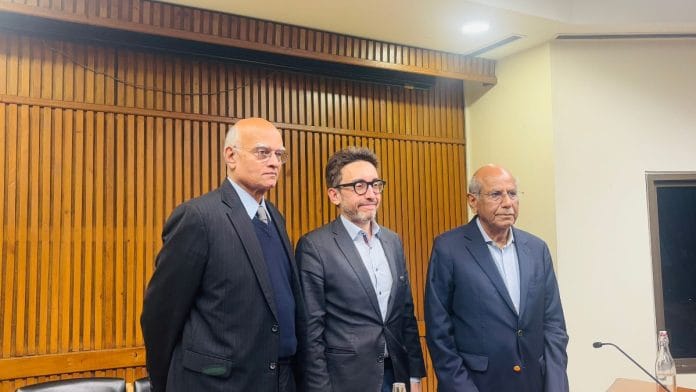New Delhi: Imagine the world like a video game. To win the game, the most powerful player has to not only build a virtual world, but preserve the ability to change the settings of the game whenever they like — similar to what engineers would call God Mode.
That’s what geopolitics looks like today to Portuguese politician and philosopher Bruno Maçães. And the winner of this video game will be the next hegemon, he said.
Maçães recently discussed his book, World Builders: Technology and the New Geopolitics, at India International Center with diplomats and former foreign secretaries Shivshankar Menon and Shyam Saran. The talk, titled Geopolitics at the End of Time, centered around how technology is forcing a new world order to emerge — one in which it’s not yet clear who’s going to come out on top.
“The present world order is unravelling,” explained Maçães. “Who’s going to win, the US or China? We don’t know yet, because the game is still unravelling.”
Technology and geopolitics are the same for him. Being a leader in technology means geopolitical control, and geopolitics represents countries jostling for power in a technological world. From the millions of financial transactions happening every second to the internet and all it encompasses — the new world order, according to Maçães, hinges on technological superiority.
“Geopolitics is about making and creating a world, and technology is the same,” said Maçães, explaining that his reading of modern history is that power comes from technology. “It’s a virtual world today, and having control over this world is more important than control over physical territory.”
A new energy revolution
The traditional way to exercise power and hegemony has changed with the introduction of nuclear energy — it’s not possible to replace a hegemon as easily as it might have been in the past.
And China realises that, said Maçães.
“There’s an energy revolution waiting to happen,” he stressed. “And we don’t know who’ll win.”
The panel talked of the previous energy revolutions that have changed the way the world works: The coal-and-steam-powered industrial revolution in the United Kingdom in the 19th century, and the electricity and factory model of production in the United States in the 20th century.
Today, the new sources of energy to be capitalised upon are solar energy and artificial intelligence, said Maçães. It’s why China has invested so heavily in developing new technologies, and why the innovation of DeepSeek has disrupted the Western world so much, he emphasised.
“In many respects, the country that’s going to rule the world is the country that’s going to connect two things and make it work: solar energy and AI.”
The panel discussed why China is such an interesting touchpoint for the rest of the world. The question everyone was asking was whether China would become a completely self-dependent technological power, and how that would impact the rest of the world. It’s now a race, said Maçães, to see who will move faster — China or America.
It’s what makes the idea of China as a global leader in the coming years so compelling. Menon pushed back on Maçães’ theory that a world order must exist to maintain some balance. But both strands of the argument converged on the idea that China would indeed have a hand in “building” a new world, and that it would most likely be virtual.
“All great powers, whether they want it or not, have to take on ruling the world. You either rule or are ruled,” shrugged Maçães.
Also read:
Where does India fit in?
The question for India, the panel agreed, was how to move toward new technologies.
“India is actually a better candidate to join the US and China in the technological world than Europe is right now,” said Maçães, referring to the innovation taking place in the country. He also explained how China has overtaken several other Western countries when it comes to technological innovation. “Don’t be surprised if societies are attracted to Chinese tech and Chinese solutions.”
The topic of Trump 2.0 and its disruptive influence wove in and out of the discussion. Donald Trump doesn’t represent an unravelling of the world order, the panel concurred —the wars in Ukraine and Gaza do. Trump represents the moment where American power ceased to be recognised as legitimate on the world stage, instead being perceived as one that relies heavily on force and aggression.
Trump has significantly altered the world order, the panellists agreed. It is no longer divided into just ‘the West’ and ‘the non-West’. He has paved the way for other countries to have a fair shot at scaling the power-ladder.
“Everyone is looking at just the short term,” said Saran. “The Chinese are delighted to have Trump because he really opens up more spaces for them.”
Maçães, who is writing his next book on India, talked about how the country can set itself apart in the global order – by focusing on scaling up a sector, industry, or skill in a way that the rest of the world can’t. For this, the country will have to decide what its national identity represents.
He talked of a 2011 meeting between Joe Biden and Xi Jinping, when both were Vice-Presidents. Jinping asked Biden to describe the US in one word – and he chose the word “possibilities.”
Unfortunately, Biden didn’t ask the question back, which would’ve given the world a crucial glimpse into how Xi sees China’s potential. Maçães and Menon then proceeded to discuss the word they would choose for China. They landed on open “government”, “state,” or “party” – all of which revolve around collective power as an organising principle.
As the talk wrapped up, and the audience began to dwindle, the question of the best word to describe India arose.
“Hope,” whispered Menon, smiling.
(Edited by Zoya Bhatti)






